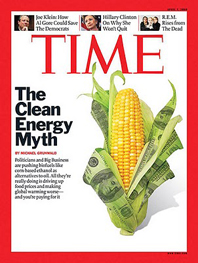Corn Ethanol and Hunger
 “Why is so much money still being poured into such a misguided enterprise?” Time Magazine’s Michael Grunwald asks about the U.S. agrofuels, and especially the corn ethanol, industry.
“Why is so much money still being poured into such a misguided enterprise?” Time Magazine’s Michael Grunwald asks about the U.S. agrofuels, and especially the corn ethanol, industry. Original calculations suggested the total greenhouse gas (GhG) emissions from agrofuels, even after the emissions in their growing and refining, were 20% (corn ethanol) to 90% (other crops) below those from burning petroleum fuels.
But there was a miscalculation. Grunwald: “…no one checked whether the crops would ultimately replace vegetation and soils that sucked up even more carbon. It was as if the science world assumed biofuels would be grown in parking lots…It turns out that the carbon lost when wilderness is razed overwhelms the gains from cleaner-burning fuels…”
Though far more effective as “carbon sinks” when they were forests and savannahs, Grunwald found the economic impetus to grow corn for ethanol is resulting in Brazilian land being coverted to farming and grazing purposes. Grunwald: “Corn ethanol, always environmentally suspect, turns out to be environmentally disastrous…”
And there is another problem. Using crops to make fuel drives food prices up. A U.N. official recently called agrofuels a “crime against humanity” for pitting “800 million people with cars against the 800 million people with hunger problems.” University of Minnesota researchers recently revised their calculations to include the problem of agrofuels and raised their estimate of the world’s hungry in 2025 from 625 million to 1.2 billion.
Here’s how it happens: U.S. farmers sell 20% of their corn crop for ethanol so U.S. soybean farmers switch to corn, so Brazilian farmers use cattle pastures to grow soybeans, so Brazilian cattlemen clear Amazonian rainforests for new cattle pastures. Sandro Menezes, biologist, Conservation International in Brazil: “The price of soybeans goes up…and the forest comes down.”
Bottom line: There is money in deforestation and none in preservation, or even conservation. Homero Pereira, Brazilian congressman/Mato Grosso farm bureau head: “If you don’t want us to tear down the forest, you better pay us to leave it up!”
Agrofuels have become Big Business. In the U.S., Iowa derives $1.8 billion in revenues and has 53,000 jobs in the industry. Agrofuels is also Big Politics. In 2007, the Bush administration pushed through legislation requiring a fourfold increase in biofuels production by 2022. When Senator Clinton told Iowans she would require all gas stations to provide ethanol by 2017, Senator Obama criticized her – for not supporting ethanol earlier. In 2000, straight-talking Senator McCain referred to ethanol as “an agribusiness boondoggle” but in 2006, his eyes on the presidency, he said corn ethanol “a vital alternative energy source.”
Brazilians want at the Big Business and resent moralizing by U.S. forest preservationists. Blairo Maggi, farmer/Governor, Mato Grosso, Brazil: “You make us sound like bandits…But we want to achieve what you achieved in America. We have the same dreams for our families. Are you afraid of the competition?”
Governor Maggi is the personification of the free market at work, as are, ultimately, U.S. politicians and business people who advocate corn ethanol incentives. Fortunately, the free market offers a solution for the rainforests. The U.N. Framework Convention on Climate Change will soon offer emissions credits for preserving the forests, thereby creating an economic incentive, via emissions trading markets, for the good guys. Maybe it will not be too little and too late.
Only a personal transportation revolution is likely to end the ethanol scam. A breakthrough in second-generation cellulosic ethanol or algae biofuel would render corn economically irrelevant – but that breakthrough is unlikely to come soon. A switch from liquid- to electricity-fueled vehicles is also a solution and also not on the near-term agenda.
Short of such changes, as Grunwald concludes, “…the world is still going to be fighting an uphill battle until it realizes that right now, biofuels aren’t part of the solution at all. They’re part of the problem.”
You can return to the main Market News page, or press the Back button on your browser.

